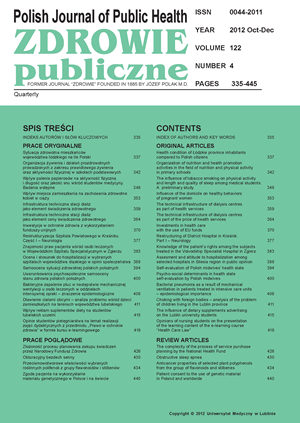Przeciwnowotworowe właściwości wybranych roślinnych polifenoli z grupy flawonoidów i stilbenów
DOI:
https://doi.org/10.12923/j.0044-2011/122-4/a.19Słowa kluczowe:
bioaktywne roślinne polifenole, flawonoidy, stilbeny, galusan epigallokatechiny, genisteina, resweratrol, ekspresja genów supresorowychAbstrakt
Liczne badania biologiczne, kliniczne i epidemiologiczne przeprowadzone w ostatnich latach były ukierunkowane na wyjaśnienie prozdrowotnej roli naturalnych, roślinnych polifenoli, w tym flawonoidów i stilbenów, na ludzki organizm. Konsekwencją działania niektórych polifenoli może być zmniejszenie ryzyka zachorowalności i/lub spowolnienie przebiegu chorób o podłożu wolnorodnikowym, takich jak choroby sercowo-naczyniowe, neurodegeneracyjne i nowotworowe. Działanie to jest głównie efektem aktywności przeciwutleniającej tych związków, co prowadzi do obniżenia puli reaktywnych form tlenu i reaktywnych metabolitów związków kancerogennych.
Niektóre związki roślinne z grupy polifenoli (tj. flawonoidów i stilbenów), występujące w powszechnie spożywanych warzywach, owocach i ziołach modulują, w epigenetycznym mechanizmie, ekspresję genów supresorowych, kodujących białka uczestniczące w regulacji wewnątrzkomórkowego przekazu sygnałów, w hamowaniu cyklu komórkowego i/lub w stymulacji genów proapoptotycznych. Te prewencyjne właściwości polifenoli z klasy flawonoidów i stilbenów mogą prowadzić do utrzymania prawidłowego rozwoju i funkcji komórek i/lub mogą spowalniać proces inicjacji i progresji nowotworzenia komórek.
Niniejsza praca zawiera ogólną naukową wiedzę na temat miejsca występowania flawonoidów i stilbenów, ich chemicznej struktury, biodostępności, właściwości przeciwutleniających i przeciwnowotworowych, z mechanizmem epigenetycznego modulowania aktywności genów supresorowych.
Bibliografia
1. Rice-Evans CA, Miller NJ, Papania G. Structure-antioxidant activity relationship of flavonoids and phenolic acids. Free Radic Biol Med. 1996;20:933-56.
2. Manach C, Scalbert A, Morand C i wsp. Polyphenols: food sources and bioavailability. Am J Clin Nutr. 2004;79:727-47.
3. Gawęcki J, Hryniewiecki L. Żywienie człowieka. Podstawy nauki o żywieniu. Warszawa: PWN; 2006.
4. Lotito SB, Frei B. Consumption of flavonoid-rich foods and increased plasma antioxidant capacity in humans; cause, consequence, or epiphenomenon? Free Radic Biol Med. 2006;41:1727-46.
5. Majewska M, Czeczot H. Flawonoidy w profilaktyce i terapii. Terapia i Leki. 2009;65:369-77.
6. Walle T, Hsieh F, Delegge MK i wsp. High absorption but very low bioavailability of oral resveratrol in humans. Drug Metab Dispos. 2004;32:1377-82.
7. Wenzel E, Somoza V. Metabolism and bioavailability of trans-resveratrol. Mol Nutr Food Res. 2005;49:472-81.
8. Stojanovic S, Sprinz H, Brede O. Efficiency and mechanism of the antioxidant action of trans-resveratrol and its analogues in the radical liposome oxidation. Arch Biochem Biophys. 2001;391:79-89.
9. Krajka-Kuźniak V. Indukcja enzymów II fazy jako strategia chemioprewencji nowotworów i innych schorzeń degeneracyjnych. Postępy Hig Med Dosw. 2007;61:627-38.
10. Yang SH, Kim JS, Oh TJ. Genome-scale analysis of resveratrol-induced gene expression profile in human ovarian cancer cells using a cDNA microarray. Int J Oncol. 2003;22:741-50.
11. Moon YJ, Wang X, Moris ME. Dietary flovonoids: effects on xenobiotic and carcinogen metabolism. Toxicol In Vitro. 2006;20:187-210.
12. Stefanska B, Karlic H, Varga F i wsp. Epigenetic mechanisms in anti-cancer actions of bioactive food components – the implications in cancer prevention. Br J Pharmacol. 2012;167:279-97.
13. Fang MZ, Chen D, Sun Y i wsp. Reversal of hypermethylation and reactivation of p16INK4a, RARbeta, and MGMT genes by genistein and other isoflavones from soy. Clin Cancer Res. 2005;11:7033-41.
14. Wang LS, Arnold M, Huang YW i wsp. Modulation of genetic and epigenetic biomarkers of colorectal cancer in humans by black respberries: a phase I pilot study. Clin Cancer Res. 2011;17:598-610.
15. Mandal S, Davie JR. Estrogen regulated expression of the p21Waf1/Cip1 gene in estrogen receptor positive human breast cancer cells. J Cell Physiol. 2010;224:28-32.
16. Pozo-Guisado E, Lorenzo-Benayas MJ, Fernandez-Salgquero PM. Resveratrol modules the phosphoinisitide 3-kinase pathway through an estrogen receptor alpha-dependent mechanism: relevance in cell proliferation. Int J Cancer. 2004;109:167-73.
17. Ullah MF, Khan MW. Food as medicine: potential therapeutic tendencies of plant derived polyphenolic compounds. Asian Pacific J Cancer Orevention. 2008;9:187-96.
18. Su Y, Simmen FA, Xiao R, Simmen RC. Expression profiling of rat mammary epithelial cells reveals cancidate signaling pathways in dietary protection from mammary tumors. Physiol Genomics. 2007;30:8-16.
19. Stefanska B, Salami P, Bednarek A, Fabianowska-Majewska K. Comparative effects of retinoic acids, vitamin D and resveratrol alone and in combination with adenosine analogues on methylation and expression of phosphatase and tensin homologue tumour suppressor gene in breast cancer cells. Eur J Nutr. 2012;107:781-90.
20. Stefańska B, Rudnicka K, Bednarek A, Fabianowska-Majewska K. Hypomethylation and induction of retinoic acid receptor beta 2 by concurrent action of adenosine analogues and natural compounds in breast cancer cells. Eur J Pharmacol. 2010;638:47-53.
21. Chuang LS, Ian HI, Koh TW i wsp. Human DNA-(cytosine-5) methyl-transferase-PCNA complex as a target for p21WAF1. Science. 1997;277:996-2000.
22. Privat M, Aubel C, Arnould S i wsp. AKT and p21WAF1/CIP1 as potential genistein targets in BRCA1-mutant human breast cancer cell lines. Anticancer Res. 2010;30:2049-54.
23. Fang M, Chen D, Yang CS. Dietary polyphenols may affect DNA methylation. J Nutr. 2007;137:223S-8S.
24. Attoub S, Hassan AH, Vanhoecke B i wsp. Inhibition of cell survival, invasion, tumor growth and histone deacetylase activity by the dietary flavonoid luteolin in human epithelioid cancer cells. Eur J Pharmacol. 2011;65:18-25.
25. Weil A. Jak się zdrowo zestarzeć. Poradnik na całe życie. Warszawa: PIW; 2008.


